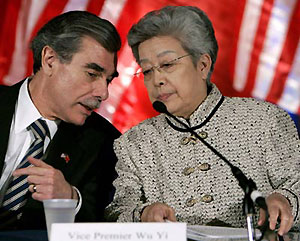Trade deals reflect resolve to cut surplus
By Dai Yan (China Daily)
Updated: 2006-04-13 05:43
Major commercial deals China has signed with the United States reflect its
sincerity to reduce the huge trade surplus, Vice-Premier Wu Yi said in
Washington on Tuesday after fruitful high-level negotiations.
 |
|
| US Secretary of
Commerce Carlos Gutierrez (L) and Chinese Vice Premier Wu Yi attend a news
conference following the annual meeting of the US-China Joint
Comission on Commerce and Trade in Washington on April 11, 2006.
[Reuters] |
| Wu, who is heading a 200-strong delegation of business people, told a press
conference that Chinese companies had signed 107 contracts with US firms worth
US$16.2 billion.
The agreements cover sectors ranging from airplanes, electronics, auto parts,
heavy equipment and software to cotton and soybeans.
Chinese airlines will buy 80 next-generation Boeing 737 planes, valued at
US$4.6 billion, in addition to the 70 Boeing 737s ordered in November during US
President George W. Bush's visit to Beijing.
The latest agreements were signed at the conclusion of the annual US-China
Joint Commission on Commerce and Trade (JCCT) meeting in Washington.
The talks on Tuesday were attended by Wu, US Commerce Secretary Carlos
Gutierrez and Trade Representative Rob Portman, both of whom praised China for
its commitments.
"In our discussions today, which were very frank and positive, we were able
to solve some problems," Portman said at a joint news conference.
To ease trade frictions with the United States, China promised at the meeting
that it would reopen its market to US beef, reduce piracy of American goods and
begin talks by the end of next year to open its huge government procurement
market to foreign firms.
Beef imports were suspended in December 2003 after mad-cow disease was found
in Washington state. Other countries including South Korea and Japan have also
banned US beef imports since then. China bought US$28.4 million worth of US beef
in 2003.
On copyright piracy, China requires all computers sold in the country be
loaded with legal operating software and to increase enforcement efforts against
all forms of copyright piracy.
|